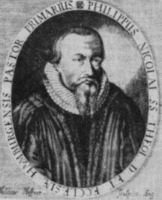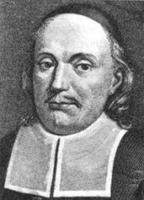Philipp Nicolai: 26 October AD 1608
 Nicolai was born in Waldeck, Germany 10 August 1556, the son of a Lutheran pastor. He entered the University of Erfurt and in 1576 he went to Wittenberg. For four years after his graduation, he lived at Volkhardinghousen and frequently preached for his father. In 1583, he was appointed Lutheran preacher at Herdecke, but because of a Roman Catholic town council, he found many difficulties there Following an invasion by Spanish troops in April 1586, a colleague re-introduced the Mass and Nicolai resigned his call.
Nicolai was born in Waldeck, Germany 10 August 1556, the son of a Lutheran pastor. He entered the University of Erfurt and in 1576 he went to Wittenberg. For four years after his graduation, he lived at Volkhardinghousen and frequently preached for his father. In 1583, he was appointed Lutheran preacher at Herdecke, but because of a Roman Catholic town council, he found many difficulties there Following an invasion by Spanish troops in April 1586, a colleague re-introduced the Mass and Nicolai resigned his call.In the end of 1586 he was appointed diaconus at Niederwildungen, near Waldeck and became pastor in 1587. In November 1588, he became chief pastor at Altwildungen, court preacher to the widowed Countess Margaretha of Waldeck, and tutor to her son, Count Wilhelm Ernst. He found himself in disagreement with Calvinists on the meaning of the Lord's Supper and worked toward having principality's clergy adopt the Formula of Concord.
He went to Unna in Westphalia in 1596 which led to more controversy with the Calvinists. Unna fell victim to the plague in 1597 and 1598, which took the lives of 1,300 of its inhabitants. From the parsonage which overlooked the churchyard, Nicolai was saddened by the continual burials. On one day thirty graves were dug. In the midst of this distress he wrote a series of meditations which he titled, Freuden Spiegel ("Mirror of Joy"). These writings Nicolai look to the hope of eternal life in Christ. On 27 December 1598, Nicolai fled before the invasion of the Spaniards, not returning until the end of April 1599. During this time Nicolai prepared his Frewden-Spiegel dess ewigen Lebens ("Joyful Mirror of the Eternal Life.")
In April 1601, he was elected chief pastor of Saint Katherine's Church, Hamburg, beginning his duties on 6 August. Life passed without many recorded incidents until 22 October 1608, when he participated in an ordination and returned home feeling ill. He developed a violent fever, dying 26 October 1608.
While in Hamburg, Nicolai gained fame for his preaching, often hailed as a "second Chrysostom." Still, we remember him most for his hymns. Of them, only four seem to have been published. These "Jesus hymns" began a new era of hymn writing in the 17th Century. Published only a few years before Johann Arndt's True Christianity, they show a similar devotional feeling toward Jesus.
Johann Heermann: 17 February AD 1647
 Johann Heermann, considered the greatest Lutheran chorale writer between Luther and Gerhardt, was influenced by Valerius Herberger, writer of the hymn, Valet will ich dir geben. Heermann was born in Silesia, studied in Leipzig, Jena, and Strasbourg, and was called to be pastor in Köben in 1611. He contracted tuberculosis in 1634 and resigned his pastorate in 1638 because of declining health. He moved from there to Lissa, Poland, dying nine years later.
Johann Heermann, considered the greatest Lutheran chorale writer between Luther and Gerhardt, was influenced by Valerius Herberger, writer of the hymn, Valet will ich dir geben. Heermann was born in Silesia, studied in Leipzig, Jena, and Strasbourg, and was called to be pastor in Köben in 1611. He contracted tuberculosis in 1634 and resigned his pastorate in 1638 because of declining health. He moved from there to Lissa, Poland, dying nine years later.Many of Heermann's hymns were written for family devotions, so much of his output was based on Johann Arndt's Paradies Gärtlein ("Garden of Paradise"). His life was filled with suffering and sadness. During the Thirty Years War, he lost everything he owned three times. His first wife died young, he developed chronic sinusitis and bronchitis, rendering him unable to speak any length without terrible coughing. In spite of this, he helped his parishoners deal with their own difficulties as they, along with him, lost everything in war, pestilence and plague. After moving to Poland on the advice of his doctor son-in-law, he was built a small home. However, his sufferings overwhelmed him more and more. By the end of his life, he could neither sit or lie down, and slept while leaning against a wall.
In spite of his afflictions, he continued writing hymns of praise and comfort. Many consider his famous "Ah! Holy Jesus" to be among the finest of all passion hymns. His writing, rooted in the Jesus mysticism of the Middle Ages, is thought to have been one of the sources for the Pietist movement.
Paul Gerhardt: 27 May AD 1676
 Paul Gerhardt was dubbed the "sweet singer of Lutheranism." He was born on 12 March 1607 in Gräfenhaim, near Wittenberg and lived during the religious wars of the 17th century. He received training as a Lutheran pastor at Wittenberg, where Martin Luther had taught a century before. However, Gerhardt didn't receive a call to a church until 1651, when he was ordained to serve the congregation in Mittenwalde, southeast of Berlin.
Paul Gerhardt was dubbed the "sweet singer of Lutheranism." He was born on 12 March 1607 in Gräfenhaim, near Wittenberg and lived during the religious wars of the 17th century. He received training as a Lutheran pastor at Wittenberg, where Martin Luther had taught a century before. However, Gerhardt didn't receive a call to a church until 1651, when he was ordained to serve the congregation in Mittenwalde, southeast of Berlin.While awaiting a call, he taught the children of Andreas Barthold — one of whom, Anna Maria, he later married. During that time he met Johann Crüger, the kantor and organist of Saint Nicholas Church, Berlin. Together they produced some of the greatest Lutheran chorales, including "Awake, My Heart with Gladness," (Auf, auf, mein Herz), "Now All the Woods Are Sleeping," and "All My Heart this Night Rejoices," among others.
Gerhardt's hymns combine a strong, objective faith in justification as a free gift from God with his own warm, subjective experience of that gift. In all, he wrote more than 120 hymns, many of which are still known and loved throughout the world.
His life, however, was difficult. He suffered greatly because of the religious wars. When asked to refrain from preaching against Calvinism by Elector Friedrich Wilhelm of Prussia, conscience would not allow him to compromise his Lutheran beliefs. He was soon deposed from office and barred from holding services even in his own home. During this time his wife and one son died, leaving him alone with a boy of six.
In May 1669, the congregation in Lübben, near the southeastern border of Germany, called him as pastor. He served there until his death on 27 May 1676. The Lübben congregation commissioned a life-sized painting of him for the church and in 1930, following renovation, the church was renamed Paul-Gerhardt-Kirche in his honor. The painting still hangs there. Beneath it is inscribed a fitting epitaph: "A theologian sifted in Satan's sieve."
Lection
Psalm 40
Deuteronomy 31:30-32:47
Colossians 3:12-17
John 16:16-24
Collect
Almighty God, through your holy apostle You taught us to praise You in psalms and hymns and spiritual songs; we give You thanks this day for the gift of hymn writing which confesses the Faith and inspires the faithful which You gave to Your servants Philipp Nicolai, Johann Heermann, and Paul Gerhardt, and we pray that Christ's Church may never lack those with the gifts of writing words and music to Your praise. May the Church be ever filled with the desire to praise and thank You for your grace, mercy, and faithfulness; through Jesus Christ, Your Son, our Lord, who lives and reigns with You and the Holy Spirit, one God, now and forever.
Technorati Tags: Lutheran | hymns | chorales | church music | Philipp Nicolai | Johann Heermann | Paul Gerhard | Martin Luther | Johann Arndt | Pietism | confessional Lutheranism | hymn writer | hymnody

